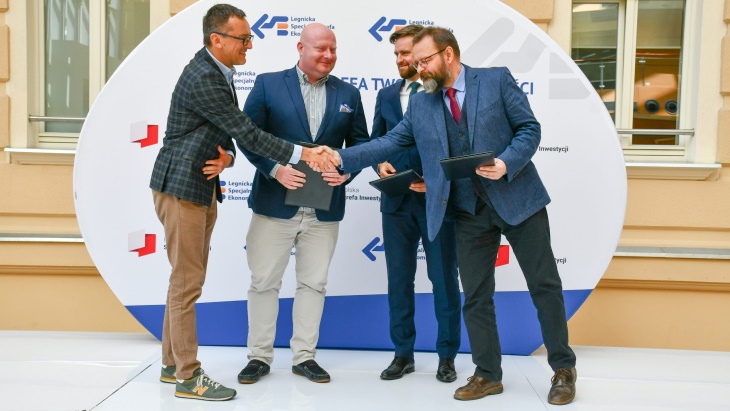US small modular reactor (SMR) developer Last Energy has signed a Letter of Intent with Poland's Legnica Special Economic Zone (LSEZ) and DB Energy on the construction of a power plant consisting of ten SMRs with a combined capacity of 200 MWe. The agreement also includes a power purchase agreement with a minimum length of 24 years by LSEZ and its tenants.

The signing of the agreement, from the left: Dominik Brach, Piotr Danielski, Damian Jamroz and Ryszard Wawryniewicz (Image: LSEZ)
"The agreement between Last Energy and LSEZ marks a significant step toward widespread SMR deployment, representing over one billion dollars in investment and more than five billion dollars worth of electricity sales," Last Energy said.
Last Energy's offer in the field of SMRs covers the entire investment process, including design, construction, financing, service, and decommissioning. Wrocław-based DB Energy will ensure the integration of the power plant infrastructure and end customers.
The Legnica Special Economic Zone - in the Dolnośląskie Province in south-western Poland - has been operating since 1997 and is now home to more than 75 companies and more than 16,000 jobs.
"This project would allow for a safe, stable and emission-free source of energy for factories located in the zone," said LSEZ President Przemysław Bożek. "We are taking another step not only towards green energy, but also to strengthen energy security."
LSEZ Vice President Ryszard Wawryniewiczof added: "Today's meeting is a continuation of the cooperation started between Last Energy, DB Energy and the Legnica Special Economic Zone. After verifying the financial and economic benefits of implementing the new SMR technology in the Zone, we moved to talks on financing and building a power plant consisting of 10 small nuclear reactors.
"As one of the first in the world, we have the opportunity to apply such technology at home. We see a great opportunity and a number of benefits resulting from the implementation of investments, including achieving real zero emissions, increasing the attractiveness of the investment areas offered or building the competitive advantage of the zone and the investors operating here."
"Poland is one of the first countries where Last Energy plans to implement our SMR technology," said Damian Jamroz, General Manager of Last Energy's Polish subsidiary, Last Energy Polska. "We're glad that the Legnica Special Economic Zone has expressed its interest in locating one of the planned investments in their area, as well as the intention to sign a long-term contract for the energy produced.
"Now, we will begin the process of identifying potential locations. Our goal is to support the process of decarbonising the Polish economy, as well as ensuring energy security for Polish industry and society."
"Our investment will provide entrepreneurs from the zero-emission zone with a stable source of energy," said DB Energy CEO Dominik Brach. "Small nuclear power plants, in particular those produced by our partner Last Energy, are the future of large enterprises on their way to zero emissions."
Last Energy is a spin-off of the Energy Impact Center, a research institute devoted to accelerating the clean energy transition through innovation. Its SMR technology is based on a pressurised water reactor with a capacity of 20 MWe or 60 MWt. Power plant modules would be built off-site and assembled in modules. Thanks to the use of ready-made modular components, a reactor is expected to be assembled within 24 months of the final investment decision. The assumed lifetime of the power plant is 42 years.
In June, Last Energy signed an agreement with Polish state-owned energy company Enea SA to cooperate on the deployment of SMRs, potentially in Poland. Under the Letter of Intent between Enea and Last Energy, the two companies will initially cooperate on the development, construction and further distribution of SMRs. It also provides for the possibility of establishing a joint company in Poland, responsible for the implementation of Last Energy's SMR technology in Poland. After confirming the economic and technological viability and obtaining relevant certificates, the companies will decide on the scope of further cooperation based on the market analyses made and the needs of the Enea Group.
"Globally, we're facing an urgent need to increase energy security without derailing our climate progress," said Last Energy founder and CEO Bret Kugelmass. "Nuclear energy offers countries a powerful strategy to achieve both. Today's agreement is a critical step toward bringing stable, reliable and cost-competitive energy to Poland, and establishing a much-needed model for how energy security and climate goals can align for the industrial sector."
Researched and written by World Nuclear News